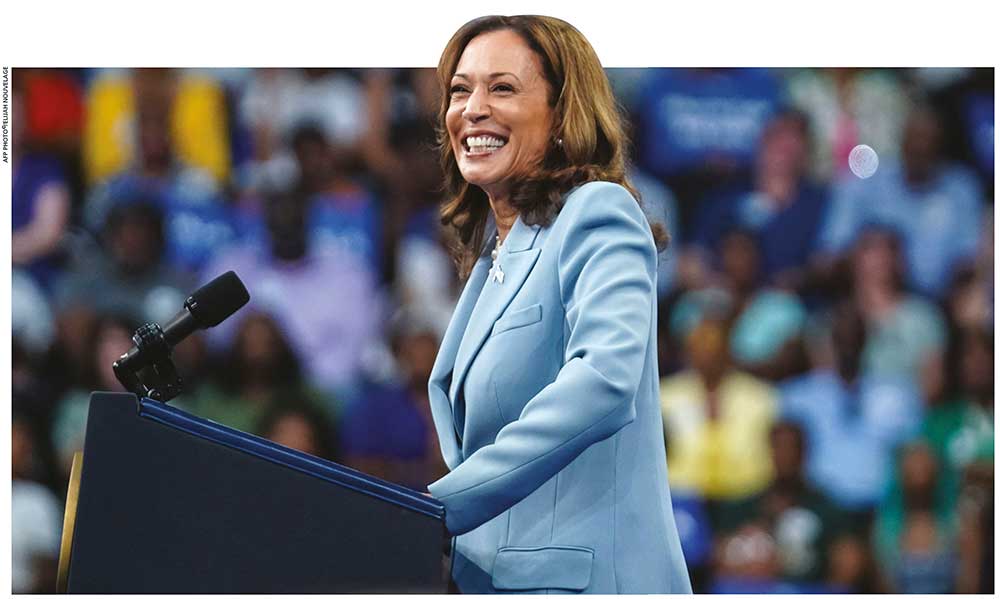US ELECTION

KAMALA HARRIS HAS BOARDED A FAST TRAIN
Saro Thiruppathy reports on the rapid ascent of Vice President Kamala Harris to become the Democratic Party’s presidential nominee

US Vice President Kamala Devi Harris’ stars seem to be aligning for her to become the 47th President of the United States. And that will make her the first woman, first African-American and first South Asian-American to be the leader of the free world.
President Joe Biden’s sudden decision on 22 July not to seek reelection saw him endorse Harris as the next Democratic Party candidate for the 2024 presidential election. And with that, the party’s voter base breathed a sigh of relief because it was evident that Biden was facing health challenges.
Until 22 July, party heavyweights including Harris had expressed confidence in Biden’s cognitive capacity. However, even before the ink had dried on the letter intimating his withdrawal, the party machinery had begun moving.
It became clear that Harris was going to be the presumptive nominee when endorsements from delegates began pouring in and funds started flooding party coffers. And on 6 August, Harris announced that she had picked Governor of Minnesota Tim Walz to be her running mate.
WHO IS HARRIS? Kamala Harris was elected Attorney General of California for two terms – in 2010 and 2014. The appointment made her the first woman, first African-American and first South Asian-American to hold that office in the state.
Subsequently, Harris served as the junior Senator from California from 2017, until she was appointed Vice President of the United States in Biden’s administration in 2020.
Harris hails from a multiracial family. She graduated from Howard University with a degree in political science and economics in 1986, and gained a Juris Doctor (JD) in 1989 from the University of California, Hastings College of the Law (now known as UC Law San Francisco).
She decided to throw her hat into the ring for the presidency in January 2019 but suspended her campaign in December when her poll numbers fell. Harris later endorsed Biden as he campaigned for the top job; and in August, he chose her as his running mate.
HARRIS’ PLANS Her likely policies are rather hazy and seem to be evolving on the run. However, many of her pledges are a follow-through on Biden’s policies. Nothing has been cast in stone and her plans sound more like a wish list, which voters have had to cobble together from various election promises and Harris’ August interview with CNN.
On her first day in office, she plans to work towards uplifting the middle class through a series of financial assistance programmes.
These include a child tax credit expansion of up to US$ 6,000 to low and middle income families in the first year of their newborns, housing down payment assistance of 25,000 dollars for first time buyers and building three million new housing units in four years.
Harris wants to help start 25 million small businesses, expand tax deductions from US$ 5,000 to 50,000 dollars, reduce red tape, ease regulations and create a standard deduction for small businesses.
She also aims to protect consumers through a federal ban on corporate price gouging in the food sector.
Harris plans to ensure that lower income adults without children will see an expansion of their earned income tax credit, support raising the minimum wage, and stop banks from padding their profits with hidden fees and surprise late charges.
She won’t raise taxes on those earning less than 400,000 dollars annually, and will eliminate taxes on tips for employees in the hospitality sector. But she intends to tax unrealised capital gains of those with a net worth of US$ 100 million and more.
On abortion rights, Harris wants to have Roe v. Wade protections enshrined in law, and also protect the right to use contraception and ensure easy access to fertility care.
She plans to continue dialoguing with big pharma to arrive at lower prices for prescription drugs for Medicare patients, place a limit on the price of insulin at US$ 35 for every patient and cap out-of-pocket expenses for prescription drugs at 2,000 dollars a year. And she intends to push for the cancellation of medical debt for millions of Americans.
Harris will work with Congress to pass gun safety measures including universal background checks and red flag laws, and institute a ban on assault weapons.
Her policy on immigration will address strong border security and a legal path to citizenship. She hopes to increase the number of border patrol agents, invest in technology to crack down on the entry of fentanyl into the US, and increase funding to stop human trafficking.
Harris aims to revive the bipartisan border security bill, which will allow the president to shut down the border after a predetermined number of migrants enter the US, hire more asylum officers and speed up the asylum claim process.
She also says that she definitely won’t ban fracking.




Leave a comment